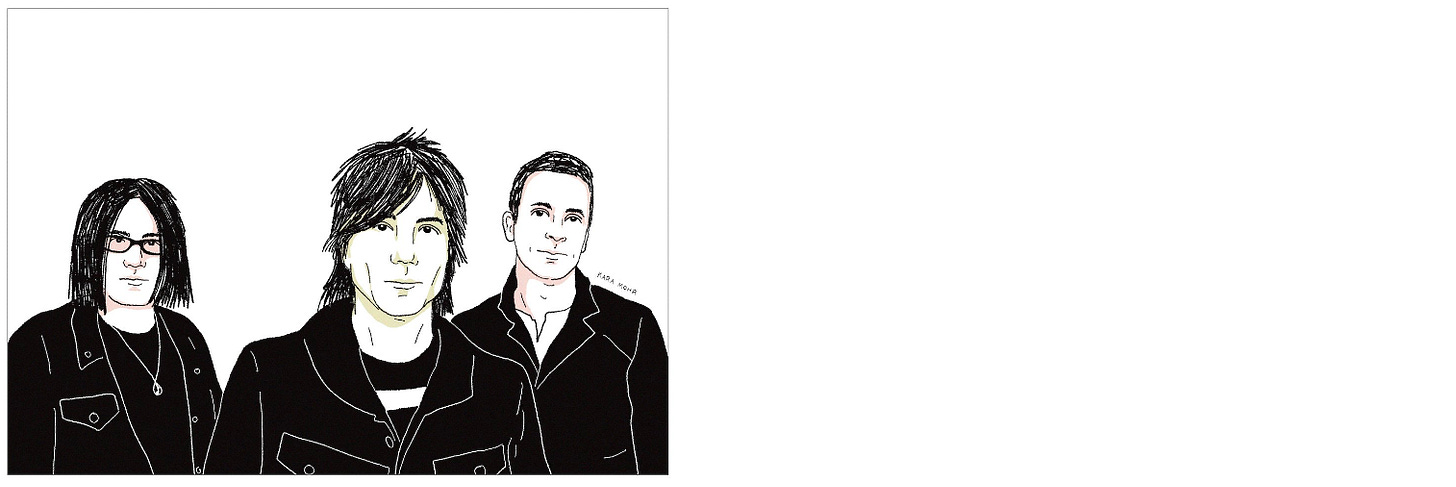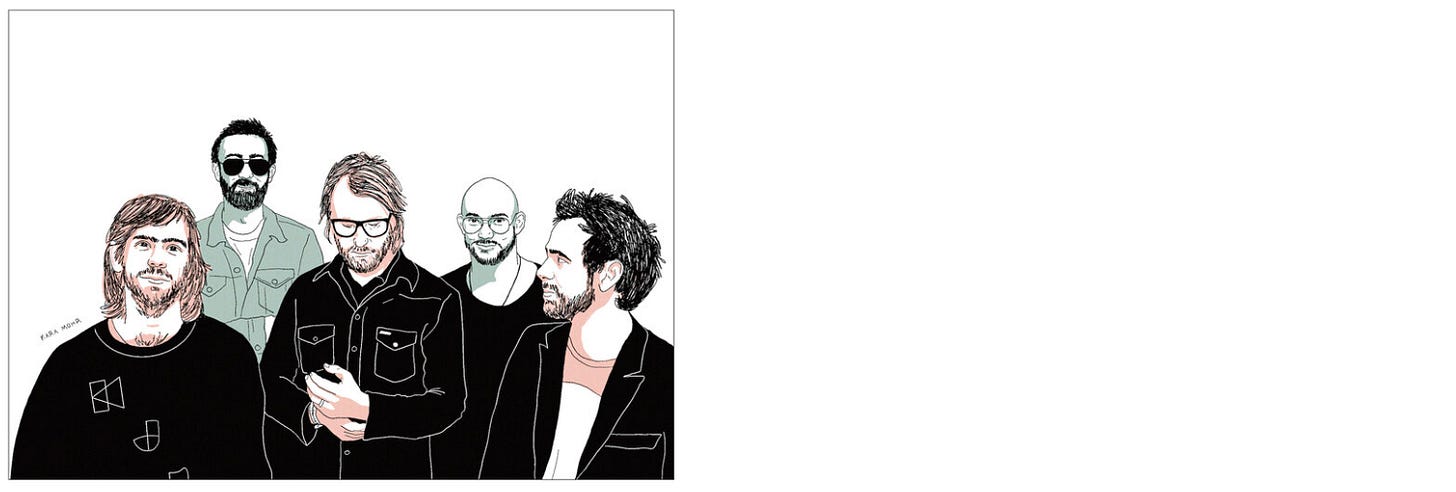Past Prime Holiday Issue
The Hold Steady, Goo Goo Dolls, Loverboy, The National, Gorman Thomas & Pete Vuckovich
They say you can’t teach an old dog new tricks. Well, then how do they explain this? We’ve moved our newsletter to Substack, which is like the TikTok for people over forty. And we’re gonna send out these “mailers” (as the kids surely call them) every six weeks instead of every eight. So, how ‘bout them tricks?
But, no doubt you are wondering: how will Past Prime Inc. pay for all of this new software & extra labor? I’m so glad you asked. Easy — we happened onto the estate sale cassette lot of the century, a veritable goldmine of Dylan, The Band, (plus Dylan and the Band), Van the Man, Van the Young Man, Van the Older Man & piles of Stones. There’s College Rock fare as well — The Replacements, REM & Hüsker Dü. Finally, don’t forget — our hoodies & our “Let’s Stay Out of Touch” t-shirts get tons of compliments at school pickups (almost exclusively from science teachers, but still).
15% off any shop order with coupon code: WINTER2023 (valid through 12/31/23)
Priming the past.
The Goo Goo Dolls’ tenth studio album was a choice — less left, less right, more middle. The ballads inched closer to Coldplay. The rockers closer to Mumford & Sons. But none of it seemed to matter much because their fate had been sealed years before — frozen in amber along with the Clinton Lewinsky scandal, McGwire & Sosa’s home run chase & John Rzeznik’s blonde highlights. For two decades they have signified “late Nineties Modern Rock that is in no way Alternative Rock.” In fact, they are the apotheosis of the form — the very best at it. And yet, in 2013, 2017 & 2020, they were destined to end up on a float in Manhattan for the Macy’s Thanksgiving Day Parade for the most obvious of reasons: November is pumpkin spice month.
The Hold Steady “Thrashing Thru the Passion”
Of course we loved them. How could we not? After The Strokes & Interpol we needed something seriously less serious. We asked, and Saint Paul answered with The Hold Steady, a bar band that was also a bard band. Five guys who liked to drink & who sounded like Thin Lizzy covering The E. Street Band covering “Tangled Up in Blue,” but with Randy Newman on vocals. Three albums in, they represented everything that was great about Brooklyn. Three albums later, they sounded more like the other side of gentrification. Album number seven, however, was a triumph — a recollection of where they had come from as well as an unflinching assessment of the price of progress.
Loverboy “Unfinished Business”
Peak Loverboy is the sound of producer, Bruce Fairbairn, and engineer, Bob Rock. So is peak Bon Jovi. So is second peak Aerosmith & fourth peak AC/DC. It’s a big sound — heavy but not pummeling, bombastic but not ridiculous. It’s also a clean sound — every instrument has its place. It was their knob turning that made Bon Jovi sound like making out, Def Leppard sound like getting off & Loverboy like dry humping. As good as Loverboy was, their brief and unfathomable greatness was really that of their producer & engineer. A quarter century after their heyday, though, without Fairbairn or Rock, Calgary’s finest Arena Rock band returned one more time, as if to show Bon Jovi and Def Leppard who really came first.
“Heart and Soul” was Cocker’s response to Johnny Cash and Rick Rubin — simple arrangements of classics, alongside unexpected takes on Modern Rock. Cocker, who had not flirted with contemporary material in decades, decided to cover (like Cash) U2’s “One” and R.E.M.’s “Everybody Hurts.” But unlike The Man in Black, who mostly narrated his way through the “American Series,” leveraging the bottom of his single octave range, Cocker pushed the upper limits of his instrument. He was like the aged athlete attempting to match the records of his youth. Like Carl Lewis trying to run a sub ten second 100 meter sprint today, at the age of sixty-two. Joe Cocker could obviously not sing in 2004 like he sang in 1969. But that was the humanity and the tragedy of this project. On occasion, it was touching and beautiful. Elsewhere, though, it was like watching a former Olympian tearing their achilles but still gutting out the race, howling and limping their way to the finish.
Shortly after Mark Mothersbaugh scored “Revenge of the Nerds II: Nerds in Paradise,” but long before he worked on “Rushmore,” Devo was in flux. Dropped from Warner Brothers, they signed to Enigma Records, a label that specialized in crossover Metal, first rate, second wave Punk & just barely mainstream Art Rock. On paper, it seemed like a perfect fit. Unfortunately for both parties, “Total Devo,” from 1988, arrived with a thud & a sigh. If their Enigma debut anticipated the band’s break-up, though, “Smooth Noodle Maps,” from 1990, sealed it. The first Devo album not to chart in any English speaking country was not so much a commercial or critical failure (though it was both of those things) as it was something that Devo had never, ever been accused of before. It was boring.
Past Prime pastime.
Gorman Thomas and Pete Vuckovich “Stormin’ & Vuke’s”
By the time Pete Vuckovich arrived to Milwaukee in 1981, Stormin’ Gorman Thomas was already a local folk hero. An average day at the office for Thomas featured three strikeouts, a long home run & maybe a walk, followed by a couple dozen beers in the parking lot. The Brewers had been bottom dwellers when he first came up. But, by 1979, they were competing for titles. And by ‘81, with their potent lineup fully assembled, they found themselves one starting pitcher away from greatness. That ace arrived in the massive form of Pete Vuckovich, who played John C. Reilly to Thomas’ Will Ferrell. For two seasons, the stepbrothers made a run at greatness while setting into motion their future plans as owners of “Stormin’ & Vuke’s,” the greatest bar in the history of Wisconsin.
Past Prime pod.
Episode 24: The National “Sleep Well Beast.”
On episode 24 of the Past Prime Podcast we go full Sad Dad. In 2017, after a decade being carried in the arms of cheerleaders, The National were disoriented. Their unexpected stardom was bumping up against their middle-aged domesticity. There was the scary new President. Members of the band even dared to leave Brooklyn for “the ru-burbs.” “Sleep Well Beast” was the band anxiously experimenting their way through the malaise of middle-age complacency.
In this episode we discuss the modern compulsion for change (“Kid A Syndrome”), modern farmhouse architecture & the fine line between anxiety & depression in The National’s seventh studio album.











